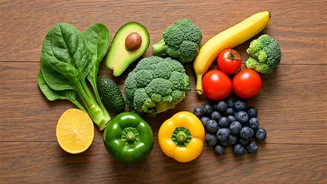Understanding Type 2 Diabetes
Type 2 diabetes is a condition where the body either resists the effects of insulin, or doesn't produce enough insulin to maintain normal glucose levels.
Insulin, a hormone made by the pancreas, acts like a key, allowing sugar (glucose) from the food you eat to enter your cells for energy. When this process doesn't work correctly, sugar builds up in your bloodstream. Over time, high blood sugar levels can lead to serious health problems, including heart disease, vision loss, and kidney disease. Lifestyle factors such as poor diet, lack of physical activity, and obesity significantly increase the risk of developing type 2 diabetes. Genetics also play a role, making some individuals more susceptible to the disease. Early detection and management are key to preventing or delaying these complications, emphasizing the need for proactive health measures.
Leafy Green Vegetables
Leafy green vegetables, like spinach, kale, and collard greens, are nutritional powerhouses for managing diabetes. These vegetables are low in calories and carbohydrates, which means they won't cause a rapid spike in blood sugar. They are rich in fiber, which slows down the absorption of sugar, leading to more stable blood sugar levels. Moreover, leafy greens contain vitamins, minerals, and antioxidants that support overall health. For example, the antioxidants can help protect against cellular damage caused by high blood sugar. Including a variety of leafy greens in your diet can be as simple as adding them to salads, smoothies, or sautéing them as a side dish. Making these green choices will contribute to improved blood sugar control and provide essential nutrients for overall well-being. Regular consumption helps in providing essential nutrients for the body and keeps it healthy.
Fatty Fish Benefits
Fatty fish, such as salmon, mackerel, and sardines, are excellent sources of omega-3 fatty acids, which have several benefits for people with diabetes. These healthy fats help reduce inflammation in the body. Chronic inflammation is often linked to insulin resistance and diabetes complications. Omega-3s can also improve heart health, as individuals with diabetes are at a higher risk of heart disease. Furthermore, fatty fish is a good source of protein, which helps in satiety and prevents overeating. Protein also plays a role in stabilizing blood sugar levels. Aim to include fatty fish in your diet at least twice a week. You can bake, grill, or poach these fish to retain their nutritional value, making them a delicious and health-conscious meal choice.
Berries for Blood Sugar
Berries, including blueberries, strawberries, and raspberries, are packed with antioxidants and fiber, making them ideal for blood sugar management. They have a relatively low glycemic index, meaning they don't cause dramatic spikes in blood sugar. The fiber in berries also helps slow down the release of sugar into the bloodstream, contributing to more stable levels. Moreover, berries are rich in antioxidants that protect your cells from damage, which is crucial for those with diabetes. Eating a handful of berries as a snack, adding them to oatmeal or yogurt, or including them in a smoothie is an easy and delicious way to incorporate them into your diet. Berries make for a naturally sweet and satisfying treat.
Whole Grains Importance
Choosing whole grains over refined grains can significantly impact blood sugar control. Whole grains, such as brown rice, quinoa, and oats, have a lower glycemic index and are rich in fiber. Fiber slows down the digestion of carbohydrates, preventing rapid increases in blood sugar after meals. Unlike refined grains like white bread and white rice, which have been stripped of their bran and germ, whole grains retain their nutritional value. Whole grains also provide essential vitamins, minerals, and antioxidants. Swapping refined grains for whole grains is a simple dietary change with substantial benefits. It can be as easy as choosing whole-wheat bread instead of white bread or adding quinoa to your meals.
Nuts and Seeds
Nuts and seeds are great for diabetes management, offering a combination of healthy fats, fiber, and protein. They have a low glycemic index and can help stabilize blood sugar levels. Fiber slows down sugar absorption, while the healthy fats and protein promote satiety, reducing the likelihood of overeating. Nuts and seeds also provide essential vitamins and minerals, contributing to overall health. Incorporating a handful of nuts or seeds as a snack can be a good way to add them to your diet. However, it's important to consume them in moderation, as they are calorie-dense. Options include almonds, walnuts, chia seeds, and flaxseeds, which can be added to salads, yogurt, or oatmeal.
Legumes Power
Legumes, such as lentils, chickpeas, and beans, are excellent sources of fiber and protein, making them an important part of a diabetes-friendly diet. They have a low glycemic index and help regulate blood sugar levels. The fiber slows down the absorption of sugar, while the protein promotes satiety and helps you feel full longer. Legumes are also packed with essential nutrients and are relatively affordable. Incorporating legumes into your diet can be done by adding them to soups, stews, or salads. They can also be used as a meat substitute, providing a healthy and satisfying alternative. Including legumes regularly contributes to better blood sugar control and overall improved health.













